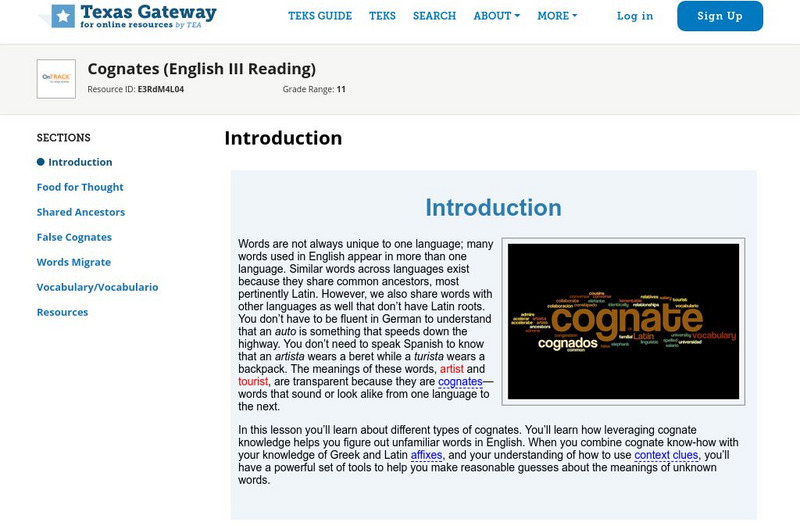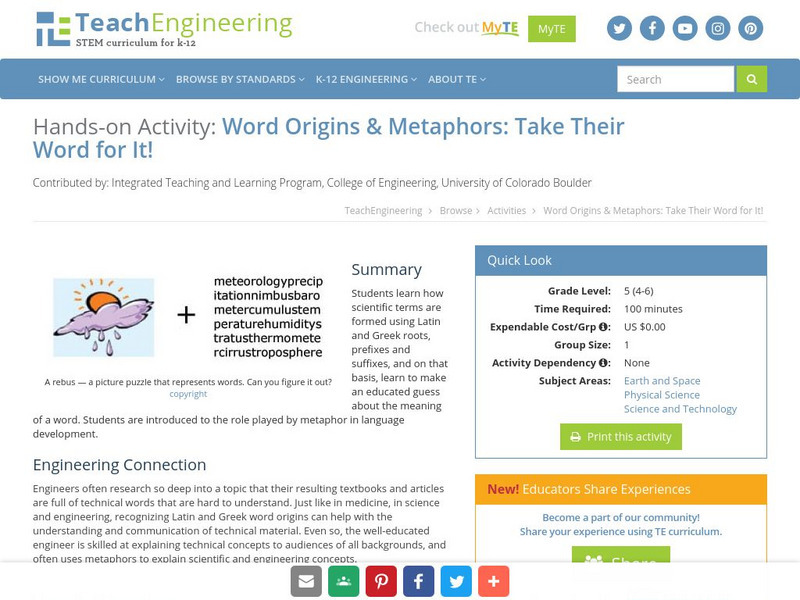Curated OER
Linguistic Humor and Language Play
By George, there are so many literary devices illustrated here! Help your pupils create interest in their writing by presenting one or two of these literary devices at a time. The slides contain examples and beg participation from the...
Owl Teacher
Teach Ancient Rome!
Teaching the class about Ancient Rome can be fun for you and for them! Check out this incredible resource that has everything you need to bring ancient Roman civilization back to life. Begin by scrolling to the bottom of the page and...
Curated OER
Defining the Difference Between Prokaryotic and Eukaryotic Cells
Students examine microscopic life by conducting a scientific investigation. In this cell analysis lesson plan, students define the prokaryotic and eukaryotic cells and discuss their word origins. Students view each type of cell on slides...
Curated OER
Charting and Graphing Sales
Students analyze graphs, charts and tables. In this data analysis lesson, students practice creating and analyzing charts, graphs and tables corresponding to sales and surveys. This lesson uses data relevant to students and includes...
Curated OER
War and International Law: A Brief History of the Law of War
Students investigate the history of the law of war. In this international law instructional activity, students listen to a lecture regarding the history of international law spanning from Pax Romana to Collective Security....
Curated OER
Practice Book O
Whether you need resources for reading comprehension, literary analysis, phonics, vocabulary, or text features, an extensive packet of worksheets is sure to fit your needs. Based on a fifth-grade curriculum but applicable to any level of...
Curated OER
Branding and Brand Names
In this brand names worksheet, students write favorite brands, discuss questions, invent new products, and more. Students complete 5 tasks.
Curated OER
Linnaeus' Latin Lingo
Students use Latin and Greek words to figure out species names for whales.
Curated OER
Rooting One's Way to Meaning
Discover the Virtual Thesaurus with your class. They use the Virtual Thesaurus to assist them in an inquiry-based approach to discovering the meanings of some common Latin and Greek roots. Each child then teaches a particular root and...
Curated OER
Onomatopoeia
Fifth graders investigate onomatopoeia. In this reading lesson, 5th graders create a list of onomatopoeic words from books read and brainstorm words of their own in small groups.
Curated OER
19c European Liberalism
If you'd like to prompt some great discussions in your history class, this presentation will surely get your class talking. Addressing 19th century liberalism in Europe (including influences from England, France, America, and Ireland),...
Curated OER
Life Science: Living Things
Have your class build their vocabulary bank by studying life science terms. Basic terms like organism, cell, unicellular, and vertebrate are included on the definition sheet provided. Demonstrate how to identify different life science...
Curated OER
Bioluminescence
Students differentiate chemiluminescence from bioluminescence. In this biology lesson, students explain how fireflies and other animals emit light. They discuss the applications of engineered bioluminescence.
Curated OER
Brown Bagging with Short Stories
Students participate in a study of short story elements, applying their knowledge and understanding to a selection of short stories. In this short stories lesson, students read five short story selections, identifying conflict,...
Curated OER
Irregular Plural Nouns
In this irregular plural nouns worksheet, students read explanations and examples of irregular plural nouns, then interactively type the plural form of 15 nouns, with immediate online feedback.
Curated OER
Regular Plural Nouns
In this plural nouns worksheet, learners write the plural forms of the nouns given to them. Students write the plural forms of 21 nouns.
Curated OER
Cognate Detectives
Second graders examine how some root words are the same in English and Spanish. They explore cognates in Spanish and English language.
Curated OER
Plurals
In this plurals instructional activity, 7th graders review and discuss how to change regular nouns into plural nouns and change twelve ordinary nouns into plural nouns.
Curated OER
Name That Place: Cultural Place Names in the United States
Students examine the origin of the people that settled in the United States. In this United States History lesson, students work in small groups to complete several activities that explore early settlement, such as a worksheet, a...
Curated OER
Geography: Where on Earth Are the Postage Stamp Countries?
Seventh graders research the six European "postage stamp" (small) countries and research interesting facts about them. In groups, they are assigned to one of the six countries of Andorra, Liechtenstein, Malta, Monaco, San Marino, or...
Texas Education Agency
Texas Gateway: Cognates (English Iii Reading)
In this lesson you'll learn about different types of cognates, words that sound or look alike from one language to the next. You'll learn how leveraging cognate knowledge helps you figure out unfamiliar words in English. When you combine...
TeachEngineering
Teach Engineering: Take Their Word for It!
Students learn how scientific terms are formed using Latin and Greek roots, prefixes and suffixes, and on that basis, learn to make an educated guess about the meaning of a word. Students are introduced to the role played by metaphor in...
University of Alberta
University of Alberta: Zoology Latin and Greek Roots Index
This University of Alberta site features Latin and Greek roots for zoological terms. The index is divided alphabetically.
Other
Vocabulary Workshop
This vocabulary workshop will be helpful to anyone interested in brushing up on their skills. This site features a comprehensive look at root words, prefixes, suffixes and more.























